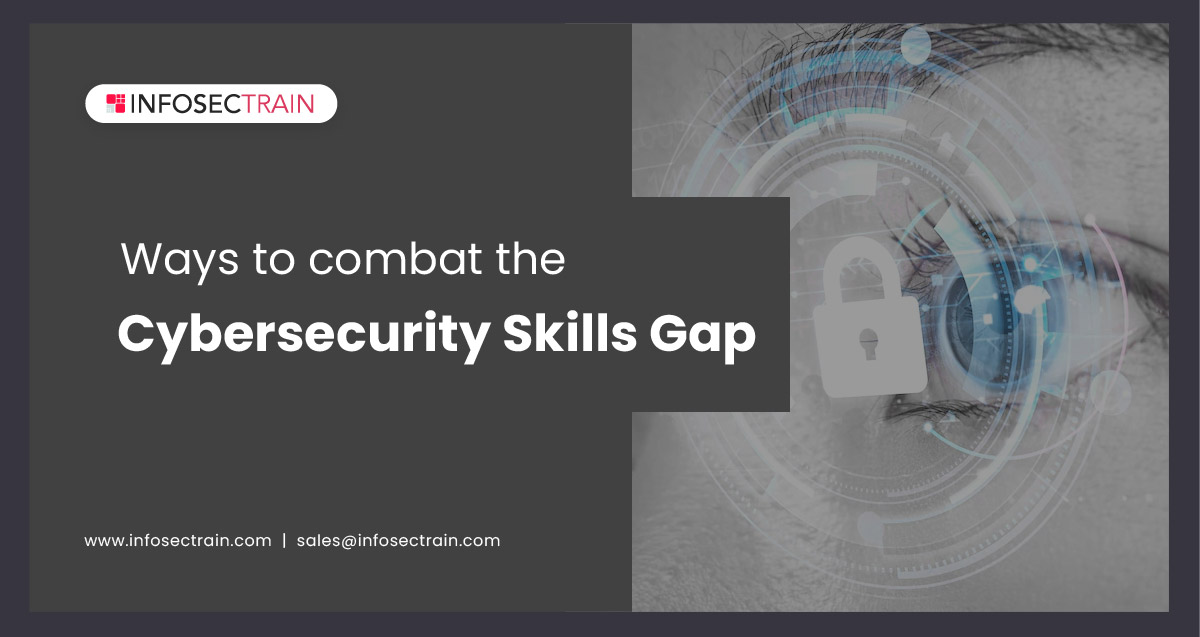Ways to Combat the Cybersecurity Skills Gap
The demand for qualified cybersecurity experts has become more significant than ever, with worldwide workforce shortages affecting 82% of enterprises. The growing attack surface, combined with the ongoing pandemic, has only complicated the problem. According to a mid-2021 study, the situation was anticipated to worsen, with pressing needs, employee stress, rising workloads, and vacant positions as the top concerns.

The cybersecurity skills shortage is one of the most severe issues faced by organizations. Many businesses are intensely focused on filling employment openings because they are under pressure to meet security commitments, but this will not be enough. To address current and future needs, organizations must establish and invest in a solid cybersecurity recruitment strategy.
In this article, we will go through how to combat the cybersecurity skills gap.
Ways to Combat Cybersecurity Skills Gap
It’s no secret that cybersecurity expertise is scarce. It’s a problem that has been troubling all organizations for years, and it’s just growing worse. Many initiatives have been made to reduce the gap, but they have failed so far. Let’s look at what can be done to overcome it and what we believe are the most effective strategies to tackle the cybersecurity skills gap.
- Collaboration with Educational Institutions : Institutions and Technical Colleges offer a variety of cybersecurity courses and degree programs that could assist in closing the skills gap in the future. Organizations should find local higher education institutions and recruit people for internships and entry-level roles in the meanwhile. The cybersecurity team members can offer to be guest speakers, arrange a tour of the organization, or inquire about hiring events with the college’s student placement team.
- Select Talent and Ability: While technical knowledge and expertise are helpful, they are not the only skills required for a cybersecurity position. Organizations should look for applicants who have talent and valuable soft skills like communication, creativity, and problem-solving. When looking for new employees, be sure that the prospects are able and eager to provide training. Also, organizations should include more cybersecurity teams in this process.
- Hire Veterans: Veterans have been used to working in high-pressure situations, using cutting-edge technology, and being entrusted with sensitive information. Organizations have numerous possibilities to sponsor veteran-focused cybersecurity training groups while also increasing their profile as a possible job.
- Search for Related Skills: Hiring managers want to locate candidates who have worked in a role comparable to the one they are looking to fill. You can broaden your applicant pool by hiring for skills rather than responsibilities in a tight labor market. Search for candidates with computer networking or ITSM abilities which can be trained on the required skill set.
- Explore Your Options: Recruiters must expand their ideas of who “fits” in a cybersecurity position. Even trained veterans don’t know everything there is to know about cybersecurity, given the ever-changing threat landscape. Indeed, because of their holistic perspective, employees who understand what technologies a company has and for what purpose may be a better fit in the long run. Curiosity and the capacity to solve issues are beneficial in various vocations, including cybersecurity.
- Automate: IT departments should find ways to promote automation and integration of workflow and maintenance procedures to speed up processes and reduce the workload. SOAR (Security Orchestration Automation and Response) solutions can boost productivity while reducing the requirement for new hires.
- Train: The training program, like automation techniques, boosts your IT security team’s efficiency. Certifications that increase a cybersecurity professional’s marketability but not necessarily their productivity are frequently obtained. Connect your team’s skill gaps to critical targets and look at training courses that will help them get the most out of their existing tools. Organizations should provide basic cybersecurity training to all employees in order to combat malware, phishing/social engineering, and ransomware assaults. Organizations should incorporate such training into daily business operations rather than treating it as a one-time onboarding effort or an infrequent project.
- Provide a Backup Staff: More than just subject material, skill is needed for security teams. They must comprehend the significance of security in the advancement of the firm and its interaction with different organization components. Members of company operations, project management, and human resources must assist the security team.
- Hire Remote Professionals: COVID-19 has changed people’s perceptions of working from home. Organizations have traditionally needed security personnel to work in a secure physical facility or Security Operations Center (SOC). While there are still benefits to having team members collaborate in the same area, IT security managers are increasingly supportive of virtual collaboration. This transition gives individuals in the sector greater flexibility, and it will make a difference in the fight against the cyber skills gap.
- Change SOC Location: The task of staffing and managing a 24-hour operation is not easy, and human behavior studies suggest that productivity and effectiveness suffer during the second and third shifts. Follow the sun-model, and make the best of your team’s productivity by scheduling their shifts during local work time. Usually, the higher qualified and more experienced experts do not agree to sacrifice their quality of life by working in the graveyard shifts.
Cybersecurity with InfosecTrain
A career in cybersecurity is rewarding, and professionals can earn any position and income they desire with a certification. First and foremost, selecting the suitable certification for one’s job description and gathering resources to fulfill the aim is essential. To help you prepare, enroll in one of InfosecTain’s cybersecurity training courses.






 1800-843-7890 (India)
1800-843-7890 (India)